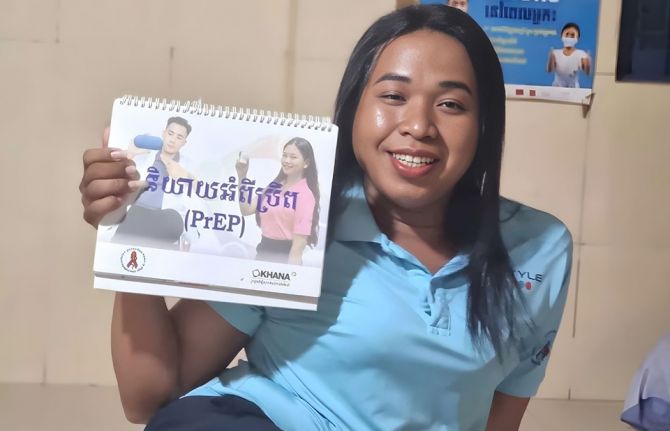
Feature Story
Community-led initiative helps LGBTI migrants to learn their rights in Ecuador
21 September 2021
21 September 2021 21 September 2021“My life is now in my hands,” says Erick González, a Venezuelan who has been living in Ecuador for almost a year. For a long time, he has looked for a place where he could feel part of society—he has found that place in Diálogo Diverso.
Based in Quito, the civil society organization created in 2018 works on the protection and promotion of human rights, with an emphasis on gender and lesbian, gay, bisexual, transgender and intersex (LGBTI) people. Through the Hablemos Positivo (Let’s Talk Positively) initiative, supported by UNAIDS, Diálogo Diverso increased its capacity to respond to the needs of LGBTI migrants during the first year of the COVID-19 pandemic.
“There are very few entities working on HIV prevention as well as the other health issues to which we are exposed as part of the LGBTI and migrant community,” said Mr González.
Diálogo Diverso is among the 61 organizations that received grants from the UNAIDS Regional Support Team for Latin America and the Caribbean as part of the Soy Clave: de las Comunidades para las Comunidades (I Am Key: from Communities to Communities) initiative, a platform that aims to promote community-led social solutions to respond to HIV during the COVID-19 pandemic.
“We have received requests from different LGBTI people: Venezuelans, Cubans, Colombians, among others. And we have identified that they all face a very similar migration process,” said Danilo Manzano, the Director and co-founder of Diálogo Diverso, which counts on a team of more than 40 people working in the cities of Quito, Guayaquil, Manta and Cuenca. “But on top of the collective needs as migrants and key populations, it was important to take into account the intersectionality with human rights and the impact of the individual challenges they face in a new country.”
“HIV is one of the reasons why LGBTI people leave the Bolivarian Republic of Venezuela, given the difficulties in accessing antiretrovirals on a permanent basis, the invisibility of their rights and, on other occasions, hate crimes,” said Andrés Alarcón, an activist with Diálogo Diverso. “This project was born from our experience in serving thousands of LGBTI migrants. And during the pandemic, we identified a particular trend among those living with HIV: lack of information and access to different health services.”
Thanks to a grant provided by UNAIDS, the project delivered hundreds of sexual and reproductive health kits, organized several conversations on health promotion, HIV prevention, sexually transmitted infections and COVID-19 and disseminated a campaign on social networks focused on raising awareness and promoting the human rights of migrant LGBTI people.
“This is a great example of how international organizations, donors and governments can invest in communities so that they can bring social solutions to their own communities while tackling key intersecting issues such as LGBTI rights and migration,” said Guillermo Marquez Villamediana, Senior Community Support Adviser for the UNAIDS Regional Support Team for Latin America and the Caribbean. “Their expertise and outreach capacity have been crucial to keeping the HIV response alive for those most vulnerable during the COVID-19 pandemic.”
One of the highlights of the project was the creation of an alliance between two community-based organizations that work with migrants and refugees in Ecuador, Alianza Igualitaria and Construyendo Igualdad, which extended their reach and allowed them to work with other populations, such as sex workers and young people.
Exclusion based on sexual orientation and gender identity compounds the violations of the human rights of LGBTI migrants and refugees in the Bolivarian Republic of Venezuela. According to a study carried out by Diálogo Diverso and the International Organization for Migration in 2020, 43% of LGBTI migrants in the country had experienced exclusion, discrimination or violence. The same study pointed out that LGBTI migrants and refugees find it difficult to access the health system due to lack of information and awareness about it.
“This project gave me knowledge about the possibilities to avoid HIV infection and transmission,” said Reinaldo Mendoza, a Venezuelan migrant who received support from Hablemos Positivo.
Reina Manteña, the President of the Women’s Association of Cantón Milagro, in Ecuador, said that the partnership with Diálogo Diverso in providing technical advice to LGBTI women has been rewarding. “Many compañeras benefited from the kits and the dialogues. Let’s not forget that in the face of this pandemic, health centres were not providing care nor condoms, which are vital for sex workers,” she said. “In addition, we have provided technical support to Venezuelan sex workers so that they could regularize their situation in the country.”
For Mr Manzano and his team in Diálogo Diverso it is gratifying to see these results. “It has never been about quantity, but the quality of the assistance we can offer and its real impact on their lives.”



